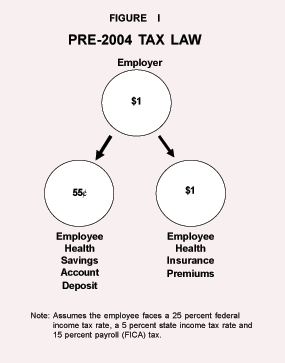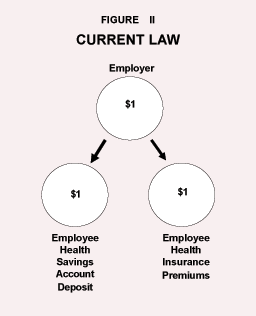In his State of the Union address, President Bush proposed a tax deduction for people who purchase catastrophic (high-deductible) health insurance, in addition to his previous health proposals. Such insurance could be combined with Health Savings Accounts (HSAs), deposits to which are already deductible.
Why single out one form of insurance for tax relief, while ignoring all others? Some may see the proposal as arbitrary and unfair. In fact, it is an important step in the direction of a more sensible health care system. Here's why.
Self-Insuring through Health Savings Accounts. As of January 1, 2004, 250 million nonelderly Americans now have access to HSAs, provided that self-insurance through an HSA is combined with catastrophic, third-party insurance. With HSAs, individuals will be able to manage some of their own health care dollars through accounts they own and control. They will be able to use these funds to pay expenses not paid by third-party insurance, including the cost of out-of-network doctors and diagnostic tests. They will be able to profit from being wise consumers of medical care by having account balances grow tax free and eventually be available for nonmedical purchases.

Creating a Level Playing Field in the Workplace. Prior to this year, the government taxed away almost half of every dollar employers put into savings accounts for employees to pay their own medical expenses directly. [See Figure I.] But every dollar an employer paid for employee health insurance premiums avoided income and payroll taxes. For a middle-income employee, this generous tax subsidy meant that government was effectively paying almost half the cost of the health insurance.
The result was a tax law that lavishly subsidized third-party insurance and severely penalized individual self-insurance. (The exceptions were Medical Savings Accounts under a federal pilot project and Health Reimbursement Arrangements – both discussed in previous NCPA publications.) This encouraged people to use third-party bureaucracies to pay every medical bill, although it often made more sense for patients to manage discretionary expenses themselves. In fact, this policy actually encouraged the HMO form of health delivery, since people got the maximum tax advantage by turning over all their health care dollars to a third-party payer.
The new law, part of the recently enacted Medicare prescription drug bill, exempts employer and employee deposits to HSAs from federal income and payroll taxes. This will give deposits to HSAs the same tax advantages formerly granted only to health insurance premiums.
Reducing the Incentive to Over-Insure in the Workplace. Not only is third-party insurance lavishly subsidized under the tax law, the subsidy is open ended. In principle, employees can always lower their taxes by buying more health insurance – no matter how wasteful. Now they have another option. Instead of over-insuring, they can get the same tax advantages if extra funds are deposited in a savings account instead.
Reducing Distortions in the Individual Market. People who purchase their own insurance can also take advantage of a tax break in the Medicare prescription drug bill. Their HSA deposits are now a deductible expense – even for income tax filers who do not itemize – when combined with catastrophic insurance. However, these individual insurance purchasers cannot deduct the premiums payments. Thus current tax law encourages too much self-insurance and too little third-party insurance in the individual market.
To help remedy this problem, the President has proposed making the insurance premiums deductible as well. This measure, if approved by Congress, will put third-party insurance and self-insurance on a level playing field in the market for individual and family policies.

Further, as in the employer market, the subsidy to third-party insurance will not encourage over-insurance, since there is a savings alternative.
Creating a Level Playing Field for the Self-Employed. Unlike other individuals who purchase their own health insurance, the self-employed currently can deduct 100 percent of their premiums, if they itemize. If the policy is catastrophic, they are now able to deduct their HSA deposits, whether or not they itemize. The Bush proposal will treat both options the same under the tax law.
Making the Bush Proposal Better. These reform measures will carefully eliminate distortions in the health insurance marketplace – distortions that have been that encouraging perverse behavior. More needs to be done, however.
In South Africa, under the administration of Nelson Mandela, a genuinely level playing field was created. That is, a Medical Savings Account (MSA) could be combined with any form of third-party insurance. As a result, the market was free to innovate and experiment.
In a typical South African plan today, for example, there is no deductible for hospital care, on the theory that patients are exercising very little discretion in a hospital setting. By contrast, there is roughly a $1,200 deductible for out-patient care on the theory that patients exercise a lot of discretion with respect to those services. Most drugs also face a high deductible. When the insurer wants to encourage drug therapies, however, the deductible may drop back to zero. This flexible approach encourages patients to make prudent choices when patient discretion is appropriate, but not when discretion is inappropriate.
There are also other interesting innovations. For example, diabetics can enroll in a center of excellence for diabetic care. They pay one-third of the cost from their MSA, while the employer (or insurer) pays the other two-thirds.
In the United States, by contrast, federal law dictates what the insurance contract must look like. In particular, the health insurance policy that accompanies an HSA must have an across-the-board deductible of at least $1,000 for an individual or $2,000 for a family, with exceptions for preventive care.
In South Africa, MSA plans have captured about two-thirds of the market for private health insurance. However, the most popular plans in that country are not allowed under the rigid parameters set for the U.S. market.
Conclusion. The Bush proposals are an important step in the right direction. The next step should be to allow the design of the health insurance plan to be determined in the marketplace, not in Congress.
John C. Goodman is president of the National Center for Policy Analysis.